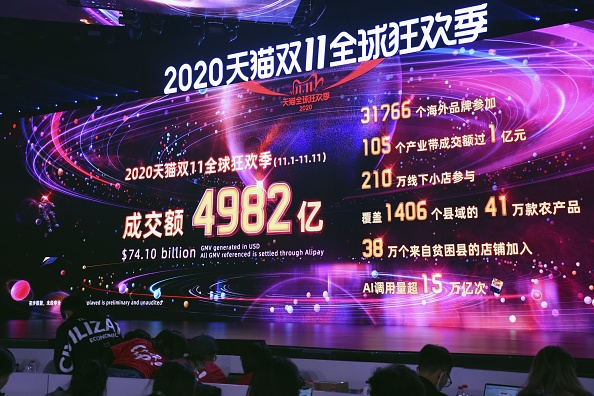
 Staying Tough
Staying ToughToday, China officially congratulated Joe Biden on becoming the 46th President-elect of the United States, after days of remaining tight-lipped on the outcome of the U.S. presidential elections. President Trump has not yet conceded, and the Trump administration has signaled that it will not relent in its position towards China, regardless of who the next President will be. On Thursday, the Trump administration prohibited U.S. companies and individuals from investing in Chinese companies that purportedly support the Chinese military. The order is set to begin mid-January of next year. "The President's action serves to protect American investors from unintentionally providing capital that goes to enhancing the capabilities of the People's Liberation Army and People's Republic of China intelligence services," National Security Advisor Robert O'Brien said on Thursday.
O'Brien also criticized China after 4 pro-democracy politicians were removed from office in Hong Kong. The move was precipitated by new legislation that prevents pro-independence lawmakers from taking office, and may set off a new round of sanctions in the region. This follows Washington's newest round of sanctions on four Hong Kong officials over the semi-autonomous region's new national security law.
As tensions flare in the region, a new Biden administration would have to appoint skilled experts to liaise with China. Top contenders for Biden's foreign policy team include former ambassador to the United Nations and former national security advisor Susan Rice, former ambassador to the UN Samantha Power, former assistant secretary of state for East Asian and Pacific affairs Kurt Campbell, and others. Read more on the Biden administration's stance on China in David Shambaugh's latest article for China-US Focus.
 Retail Therapy
Retail TherapyChina celebrated its 9th annual Singles' Day holiday this week, with e-commerce giants Alibaba and JD.com bringing in close to a combined $115 billion profit from the online shopping bonanza. Months after an unprecedented national coronavirus lockdown, this year's Singles' Day showed signs of China moving towards economic recovery. Still weary of the pandemic, Chinese consumers have significantly reduced travel, freeing up extra cash to be spent in other areas.
But despite the record-breaking sales, new anti-monopoly regulations put forth this week overshadowed the e-commerce industry's gains. The regulations will likely reign in the growing influence of tech giants in China, which some say threaten the government's hold on the country. Ant Group, which is owned by Alibaba, had its IPO blocked by the regulations. The effects have dealt a blow to some of China's tech giants; a total of $250 billion has been erased from four of China's top tech companies, including Alibaba, JD.com, Meituan, and Tencent.
 Uncertain Progress
Uncertain ProgressWhile U.S. drugmaker Pfizer announced a breakthrough coronavirus vaccine this week with purported 90% efficacy, Chinese vaccine-maker Sinovac suffered a delay after a "serious adverse event" paused China's experimental vaccine efforts in Brazil. The event, which later was revealed to be a suicide in one of the trial participants, seems to be unrelated to the vaccine. Sinovac's phase-3 trials resumed days later, with Chinese foreign ministry spokesman Wang Haibin commenting on the "good cooperation" between China and Brazil. And, while the U.S. celebrated its own vaccine progress, Pfizer still has to wait on rounds of government reviews before the vaccine can be sold commercially.
There are currently four experimental vaccines being tested in China, although they're not quite ready to go to market. Sinovac and Sinopharm, China's two top vaccine makers, have been testing for months now, with "hundreds of thousands" of people participating in the trials, according to Sinopharm. As China and other countries continue to make progress, ongoing transparency and safety of International scientific research will be needed to maintain public global trust in an eventual vaccine.
Prepared by China-US Focus editorial teams in Hong Kong and New York, this weekly newsletter offers you snap shots of latest trends and developments emerging from China every week, while adding a dose of historical perspective.
- 2020-11-07 Battleground Ballots
- 2020-10-30 Knock Knock
- 2020-10-24 Looking Back and Moving Forward
- 2020-10-16 COVID Cluster
- 2020-10-10 Election Looming
- 2020-10-03 Golden Week Kicks Off
- 2020-09-26 Virtual Diplomacy
- 2020-09-18 Digital Domain
- 2020-09-12 Reframing the Ground Rules
- 2020-09-05 Reciprocity in Action
- 2020-08-29 Who’s Tougher on China?
- 2020-08-22 To Talk, Or Not To Talk
- 2020-08-15 Domestic Circulation
- 2020-08-07 Fraying Relations
- 2020-08-01 Turning Tides
- 2020-07-24 Up in Smoke
- 2020-07-17 Status Stripped
- 2020-07-10 A Historic Moment
- 2020-07-03 Handover Tested
- 2020-06-27 Relationship Spiral